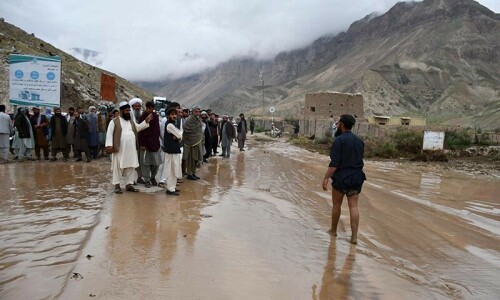PESHAWAR: Stressing the need for stemming the tide of adverse impacts of climate change, a senior economist on Wednesday said Pakistan’s economy had suffered $20 billion losses due to the changing weather patterns in the recent past.
Speaking at a workshop on ‘Climate Change: Raising Threats and Challenges’ here, Dr Mohammad Rafiq who teaches at the Institute of Management Sciences Peshawar said Pakistan required to devise comprehensive strategy to minimise the losses from the negative impacts of climate change.
The Sarhad Conservation Network and Friedrich Naumann Foundation for Freedom (FNF) jointly arranged the event to sensitise journalists and civil society groups to climate change and its impact on the human wellbeing.
Referring to a report of the federal government, Dr Rafiq said the country had suffered $20 billion losses due to climate change.
He said the climate change was happening and that that change in Pakistan was higher than the global average as major part of the country lied in arid and semi-arid region, which had already been bracketed a heat-surplus zone.
Dr Rafiq calls for a strategy to minimise losses due to changing weather patterns
Dr Rafiq while highlighting negative impacts of climate change on the economy and people said the temperature increasing since 1990 had badly affected agriculture, water and health sectors.
He said the role of Pakistan in climate change was negligible but still, it would be included among the most affected states.
The economist said livelihood were predominantly climate sensitive in Khyber Pakhtunkhwa and other parts of the country and that adverse impacts were very likely on agriculture, soil, water, forestry, livestock and fisheries.
He said Pakistan could face water scarcity in future due to earth warming.
Dr Rafiq said Pakistan was the fourth vulnerable state to climate change and if the trend continued on the same pattern, then it would become the second or third vulnerable country in the world by 2020.
He said the Khyber Pakhtunkhwa government’s green growth initiative including plantation of one billion trees in the province was a positive step that could help minimise negative impacts of the global warming.
Dr Adil Zareef of the SCN said climate change caused the outbreak of infectious diseases, particularly malaria, dengue and cholera, while the environmental pollution spread respiratory, cardiovascular and other non-communicable diseases.
He said the climate change could cause approximately 250,000 additional deaths per year from 2030 to 2050.
Dr Adil said Pakistan’s social and public health system was not very efficient and therefore, the people were prone to negative impacts of climate changes.
He said situation in Peshawar was alarming due to increase of dust particles in the air and that it had gone beyond the World Health Organisation’s standards.
“The burning of rubber in brick kilns has been banned but tyres are being used in kilns around Peshawar. The rubber, which is burnt in around 400 brick kilns in Peshawar district, has become a major source of air pollution and chest and respiratory illness,” he said.
Dr Inamullah of the Agriculture University Peshawar said the temperature of the earth was increasing with the average 0.5 degree centigrade in one decade and that after the passage of 100 years, it would reach five degree centigrade, which was alarming.
He said the temperature was adversely affecting the growing period of crops and that the production of wheat would become difficult in Peshawar by 2060.
Dr Inamullah said the phenomenon of climate change would have adverse impacts on the yield of other crops in the region too.
Published in Dawn, December 10th, 2015












































Dear visitor, the comments section is undergoing an overhaul and will return soon.